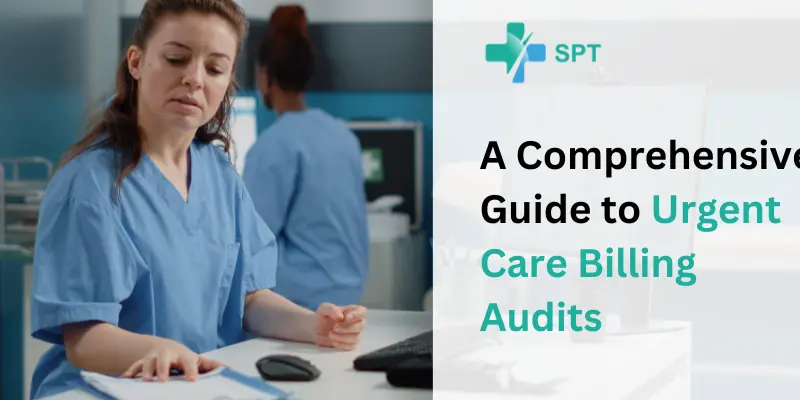You need to do billing tasks well for urgent care centers. It’s hard because they do many services and rules change often. Urgent care billing audits help with this. They check that you get paid correctly for what you did. They find mistakes and help you make more money. This guide explains urgent care billing audits. It shows why they’re good, how important they are, and ways to do them. It also gives tips to make audits easier.
Benefits of Urgent Care Billing Audits
Regular medical billing audits for your urgent care billing offer a multitude of advantages, fostering a healthy financial future for your center:
- Reduced Errors and Improved Accuracy: Healthcare billing audits carefully examine your practices. They find mistakes and coding errors. This proactive approach prevents claim denials. It ensures you get paid correctly for services provided.
- Enhanced Compliance: Healthcare has many complex rules and regulations. Audits help make sure your center follows all coding and billing guidelines. These guidelines come from insurance companies and government agencies. Following guidelines minimizes risks of penalties and legal issues.
- Revenue Cycle Optimization: Audits identify areas that need improvement. They help streamline your billing processes. This results in faster claim processing. It leads to quicker reimbursements and better cash flow.
- Improved Internal Controls: Audits find the weak spots in your billing system. This helps you make stronger rules for your billing team. These new rules allow everyone to see what is happening and take responsibility.
- Fraud Detection and Prevention: Audits work well to stop billing fraud before it starts. Regular check-ups catch any strange activities. This protects your center from losing money and keeps your good name.
Why Urgent Care Billing Audits Are Important
Working in the healthcare business today is really hard. To succeed, urgent care centers must make good money and run well. Regular billing reviews are key to doing those things. Here’s why:
- The Many Services at Urgent Care: Urgent care centers offer way more services than regular doctors’ offices. All the different things they do means they need correct codes and bills. This captures how complex and resource-heavy each patient visit truly is.
- Rules Keep Changing: Healthcare has new rules all the time. Checking your billing makes sure your center follows the latest coding and billing guidelines. That way you avoid costly urgent care billing mistakes and denied claims.
- Increased Scrutiny by Payers: Insurance companies are carefully checking medical claims. They make sure the claims follow the rules. The companies look for any problems. If they find issues, they may not pay the claim. Or, they may ask for money back.
When To Conduct An Urgent Care Coding Audit?
There’s no one-size-fits-all answer to this question. However, some situations necessitate scheduling an urgent care coding audit:
- Claim Denials: Many claim denials point to coding or billing issues. An audit finds the cause. It helps fix the problem.
- Coding Updates: Coding rules like ICD-10-CM change often. Your staff must keep up. An audit checks if they code correctly. It ensures they follow the latest rules.
- New Staff: When you hire medical billers, an audit tests their skills. It reviews if they code accurately. It teaches best practices.
- External Audits: Insurance firms and the government do audits too. An internal audit first finds any mistakes. This allows you to correct issues before others check.
Urgent Care Billing And Coding Audit Checklist
Following a thorough checklist helps ensure proper urgent care billing and coding. Here is what to review:
- Patient Info: Make sure the patient’s name, birthdate, insurance details, and referral are correct.
- Medical Records: Check that the records show the right reason for visit, medical background, exam findings, diagnosis, and treatment plan.
- Coding: Verify that the codes given match the services provided. They should follow current guidelines like ICD-10-CM and CPT coding rules.
- Place of Service (POS) Coding: Confirm that the Place of Service (POS) code correctly reflects the location where the services were rendered (e.g., urgent care center).
- Modifier Usage: Check if you used the right words to show any extra services you gave to the patient. This proves what you did for them.
- Supporting Documentation: Have all the papers ready that prove what services you gave. This includes doctor’s notes, lab test results, and pictures from scans.
- Charge Capture: Look over the system that keeps track of charges. Make sure it shows all the services you gave correctly. Check that it used the right words and follows your office’s fee list.
- Coding Compliance: Look at how you code things to make sure you follow the Healthcare Common Procedure Coding System (HCPCS) Level II codes and words. Check that the codes you chose match how hard and complicated the services were.
- Payer Specific Reimbursement Rules: Check the billing rules and pay policies of each insurance company your center works with. This ensures you bill for services covered under the patient’s plan and follow any special coding needs.
- Denial Management: Look at how you manage claim denials. Understand why claims get denied. Then, fix errors and take steps to stop future denials.
- Coding Staff Training: Regularly check your billing staff’s coding skills and knowledge. Give ongoing training so they know the latest coding guidelines and best ways to code.
- Audit Trail Maintenance: Keep a full record of everything in the billing process. This includes notes on coding choices, paperwork, and claims sent. This record can help you later. It can also help if someone checks your work.
Also Read: Medical Billing Audit Checklist.
Types Of Urgent Care Billing And Coding Auditing
There are two primary approaches to conducting urgent care billing and coding audits:
- Internal Audits: These audits happen inside your office. Your own staff does them. Internal audits give you more control. You can fix problems right away if found. But, your staff knows your ways. So, internal audits may miss some issues.
- External Audits: Outside companies do these audits. They are experts in medical billing and coding rules. Outside audits give a fresh view. They can find issues your staff may miss. But, they cost more than internal audits.
Picking the right audit type depends on things like your office size, money, and risk level. Talking to a billing and coding expert can help you decide the best way for your needs.
Outsource To Medical Auditing Company: Advantages and Considerations
Outsourcing your urgent care billing and coding audits to a dedicated medical billing audit company offers several advantages:
- Expertise and Experience: Companies that audit medical records have deep knowledge of healthcare rules and coding methods. Their experience allows them to find even small billing mistakes.
- Improved Efficiency: When you hire outside help, your own staff can focus on their main jobs. This improves overall work quality.
- Objectivity and Independence: Auditors from other companies offer an unbiased view. They are less likely to miss errors due to familiarity.
- Technology and Resources: Medical auditing firms often use advanced tools. They can access huge databases for complete audits.
However, outsourcing also comes with certain considerations:
- Cost: Getting audits from outside companies is more costly than doing them in-house. This choice may cost you more money.
- Loss of Control: When you hire outside auditors, you’ll have less control over the audit process. You don’t get to manage everything directly.
- Communication and Transparency: It’s important to pick an audit firm that is open and honest. They should keep you updated at all times.
Think carefully about these factors. Then decide if you want outside help for auditing your urgent care’s billing and coding.
Conclusion
Checking urgent care bills is very important. It helps get paid correctly, make more money, and follow the rules. Things change a lot in healthcare today. So, understanding why bill checking is good, why it matters, and how to do it right, can help your urgent care center run well. It can help you do better than others. Remember, checking bills often and fixing mistakes will help your center make enough money and follow the rules.





